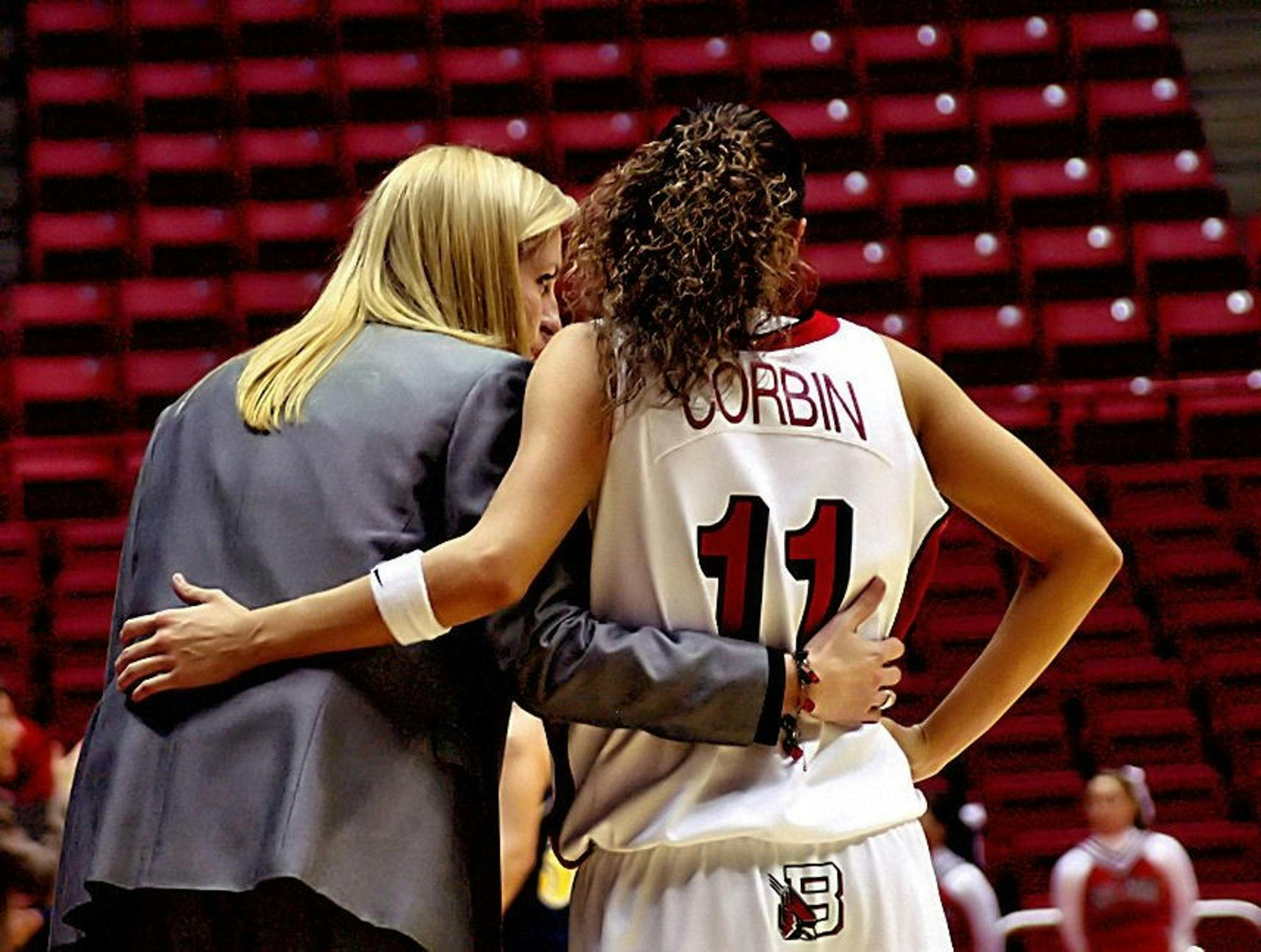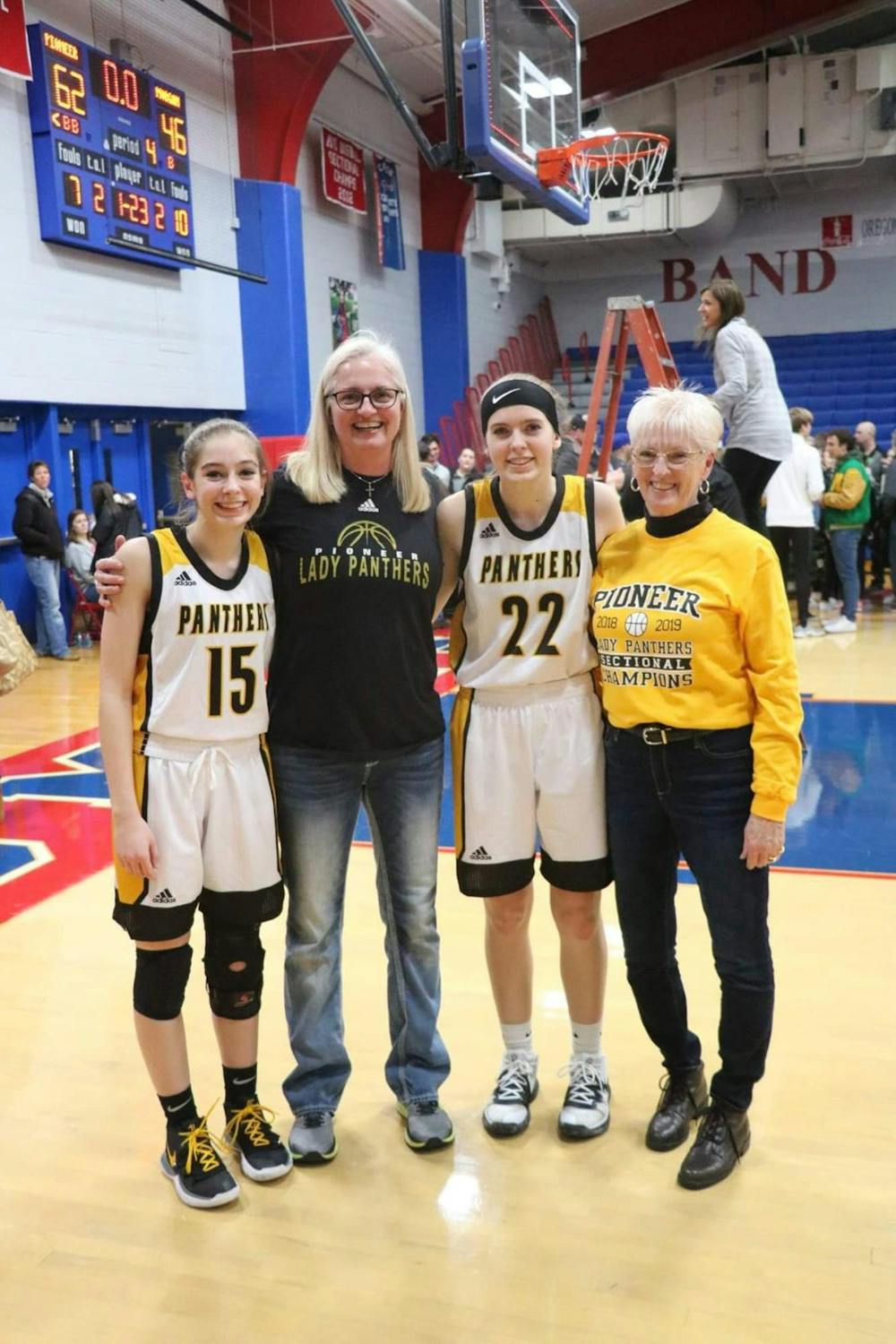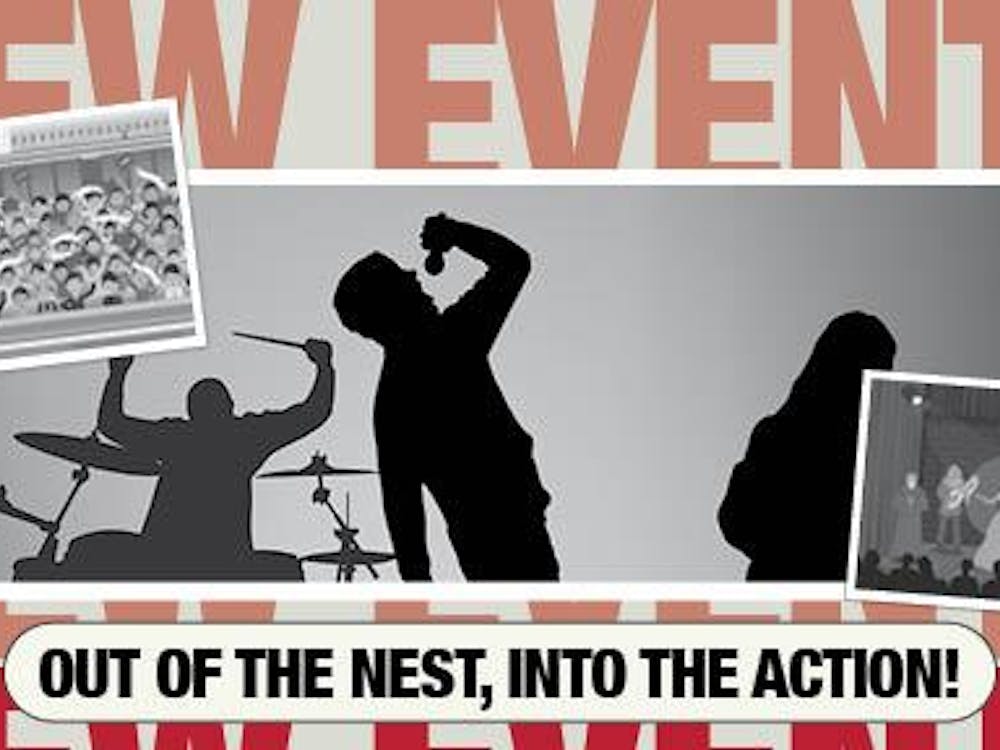For many, finding an identity as a member of the LGBTQ+ community is liberating. For Tracy Roller, it was like going through the wringer for nearly three decades.
The former Ball State women’s basketball head coach officially resigned from her position April 2, 2008. However, she missed much of the 2007-08 campaign due to her ongoing alcoholism and mental health issues.
Roller said many of these problems were brought on by the mental game of seesaw she was playing with revealing her sexuality to the public.
“It probably would have destroyed my recruiting because, at that time, people were ruthless,” Roller said. “For them to say, ‘I can't come to your school, because my parents won't let me.’ I just couldn't handle that.”
Roller felt she had to walk on eggshells and hide her identity as a lesbian from the Muncie community, for fear of negatively affecting the Cardinals. She even sacrificed an ongoing relationship for the same reasons.
“I had other guys I knew were gay using it against me because it was almost safer to go play for a gay man — in a parent's eyes — than it was to come and play for someone who could recruit you for ‘the lesbian team,’” Roller said. “Of course, no one ever said that to my face, but in my mind, I knew that was happening.”
In her mid-30s at the time, Roller had known about her identity for more than a decade despite not being fully out.
“I didn't know how I felt about it until I kissed my first girl, and then it was like, ‘Wow, this is different,’” Roller said. “I didn't want people to find out. I was embarrassed about it, and that's when the drinking started.
“I was a train wreck in college, mostly because I was embarrassed about my sexuality.”
Even as a key player for Eastern Illinois’ women’s basketball during her four years as a Panther, Roller’s alcoholism continued. Roller said it may have encouraged it.
Her drinking became an addiction. Roller began sneaking alcohol into classes and even the locker room before games.
In 1999, Roller was hired as an assistant coach for Ball State women’s basketball. However, she missed the Cardinals’ first practice of the season after receiving a DUI on the way home from a gay bar in Indianapolis the night before. Roller spent that night at a jail in Anderson, Indiana.
It took Roller five years to get sober after leaving the program in 2008, officially beginning her sobriety in 2013. However, she still feels like she let the program down 16 years ago.

“If I was able to mentally and emotionally take on that stress and pressure, I would be at Ball State,” Roller said. “I could not let that part of me get proven right. Alcoholism, mental health and my sexuality were the three reasons why I stepped away.”
Roller feels many members of the community could have guessed her sexual identity, but with no proof, she felt more secure. Now, in her role as a personal banker at FlagStar Bank in Peru, Indiana, Roller said she is “way out.” What’s more, she is comfortable in her own skin.
Kiley Jarrett remembers going to a Puerta Vallarta in Muncie after a Ball State women’s basketball game during her freshman season with her mother and sister. She finally felt ready to open up about her sexuality and was greeted with nothing but support.
Coming out to her family was never much of an issue for Jarrett given her close bond with her close relatives. The Bloomington native said she had had a partner for a couple of months at the time and was ready to introduce them to her family; she didn’t want to hide anything.
When it came to letting her teammates know, that was even less of a concern for Jarrett, as she estimated nearly 50 percent of the Cardinals’ roster and staff identified as gay at the time.
“It was no different than a heterosexual [person] having a boyfriend,” Jarrett said. “We were extremely close with one another; we were like family, so it really wasn't a big deal.”
Former Ball State women’s basketball player Tina Bolte said it was hard coming out, but the bonds and trust she had with her teammates helped solidify stronger relationships.
“There was still a stigma about it as far as where you were regionally,” Bolte said. “Within our program culture, the initial coming out part was maybe harder [than it is now]. I had teammates that were gay, but everybody accepted everybody for who they are.”
During Jarrett’s four seasons with the program, at times playing alongside Bolte and for Roller, Jarrett said she never felt like she couldn’t be her true self around her teammates. Jarrett couldn’t even recall a single instance of prejudice against her sexual identity while she was in college.
She realizes many other members of the LGBTQ+ community aren’t so lucky and wants to continue fostering conversation surrounding LGBTQ+ issues to establish normalcy for the topic further.
“Who someone chooses to love is only really that person's business; it doesn't affect anyone else,” Jarrett said. “If people could take a step back and realize if they choose to love someone, and they're free to do so, then why can't someone of the LGBTQ+ community not have that same opportunity without being criticized or looked at differently?”
Although Ball State Athletics Hall of Famer and former director of athletics Andrea Seger doesn’t identify as a member of the LGBTQ+ community, she is a proponent of athlete diversity and equality. She said during her near tenure at Ball State from 1983-2002, she doesn’t remember many conversations being had at the administrative level about the treatment of LGBTQ+ athletes.
Seger said Ball State athletics' main objective at the time was making the student-athlete experience enjoyable for as many as possible with the only structured programs in place being for athletes of color or women’s athletes. Seger said she was certain there were athletes or staff who were in the LGBTQ+ community, but she and most in Ball State athletics’ higher regime tried to stay out of student athletes’ personal lives.
In 1993, the NCAA established a certification program throughout Division I athletics, mandating college athletic departments to have programs promoting equality and diversity in writing.
Seger even said she felt there may have been the possibility of some students from small towns coming to Ball State who had never been exposed to members of the LGBTQ+ community or people of color. She said athletics tried to play a part in making sure they could change that for new students.
“It was an excellent experience for our athletes to be able to interact and become friends with teammates and students that were different than them,” Seger said.
Seger said Ball State athletics should have done more to actively support and encourage gay athletes during her time in Muncie.
“I think, maybe, we did a disservice to the LBGTQ+ students,” Seger said. “I think sometimes we tend not to pay attention if there's not people coming forward and saying, ‘We need this.’”
Kelsey Corbin was a Cardinal with Bolte and Jarrett from 2003-2007. In Corbin’s eyes, the locker room of a sports team is a microcosm for society.
“It's not just about sexuality — it's about the differences in socioeconomic status, the racial differences, the differences about how we grew up, and what we think and how we view the world,” Corbin said. “That is an invaluable training ground for anyone in life.”
The relationships Corbin made in the locker room by being her most vulnerable and authentic self are bonds she still cherishes today.
“All these people who went through this very formative time [for me], are still the people that are my best friends now,” Corbin said. “You couldn’t ask for anything better.”
Corbin said before she came out to her family, friends and teammates, there had to be self-acceptance first. She described her process of coming out as a long evolution, which is why she wasn’t fully herself until she got out of school.
“Until you've really accepted it yourself, I'm not really sure that I knew 100 percent that was my sexuality. I toed the line there for a while, not really willing to admit [it],” Corbin said.
It was when she moved to Atlanta, Georgia, that Corbin said she started to own who she was. With a fresh start in a new city, she felt comfortable being open about her sexuality. In Atlanta, she met her wife of three years, Katie Adams.
While Jarrett has been a member of the Bloomington Police Department for nearly a decade, she just began her first year as the head coach for Bloomington High School North’s girls’ basketball program. Jarrett said she tries to encourage her players to be their authentic selves by showing them that she does the same, often bringing her wife around the team and being fully accepted by not only her players but their parents too.
She said in situations where players for her team have felt compelled to come out to her, she has treated the conversation as she would any other.
“There still is a stigma, but I think it is weakening, and it is just becoming normal,” Jarrett said.
Jarrett has been in a 12-year relationship with her wife, who she has been married to for five years.
Hailing from the Hoosier state, Bolte still has family living in Southern Indiana. Besides Indianapolis, Bolte does not think the state as a whole is accepting of the LGBTQ+ community.
“Indiana is on the line. It would depend on where you are and anytime you are around a college things get a little bit more accepting,” Bolte said. “I never felt unsafe in Muncie.”
Roller agreed.
“I bet a million dollars if I started making out with a girl in downtown Logansport, there'd be somebody that would have trouble with it; that shit still happens,” Roller said. “But there are definitely pockets [of the country] that are accepting.”
Married to Kate Achter, Bolte moved with Achter to Xavier, Loyola-Chicago and now Detroit Mercy where Achter is the head coach.

Bouncing around for years, the couple is now settled in Detroit with their two children.
“The conservative states and states where the political climate is different, we hesitate for places like that,” Bolte said. “My wife has been strategic in thinking about her options. There are certain jobs she would never go after even if they are open or desirable. That is just the reality of it.”
Living in a progressive Chicago climate for six years, Bolte said her views on acceptance across the nation have been “skewed,” but that changes based on location.
“Things took a big swing [in the positive direction] for a while when marriage got legalized,” Bolte said. “I have to say, more recently, we feel a little less like things are so accepting. I think the culture has moved forward, but I also think it has taken a slight step back.”
From city life in Chicago to living in a suburb of Detroit, Bolte said they are the only gay couple in the neighborhood.
Corbin described her experience as a Ball State student athlete as a positive one, though she still felt apprehensive about stepping out into the community.
“I thoroughly enjoyed Muncie,” Corbin said. “But it was still a smaller town … and the perception was that you had to be a little bit more careful. Did I feel super comfortable walking down the street, holding my partner's hand at that time? I didn't.”
As a Cardinal, Corbin racked up 1,000 career points, 400 career assists and 400 career rebounds. With a key role, identifying as lesbian to her teammates was difficult.
“Not being accepted, potentially, was scary. Especially around all those things I loved so dearly,” Corbin said.
It’s been nearly a decade since Corbin left basketball to pursue career opportunities. With an outside perspective, she said she’s seen acceptance in women’s sports grow. Corbin said famous athletes like Sue Bird, Diana Taurasi and others who are open with their sexuality have created a culture of “normalcy” for LGBTQ+ athletes.
“As that started to happen, I started to see more coaches who were open and had their spouses or partners at their games or listed on the [team] website,” Corbin said. “I believe that was non-existent at the time I was still playing, and it has changed immensely for the better.”
Contact Kyle Smedley with comments via email at kyle.smedley@bsu.edu or on X @KyleSmedley_. Contact Elijah Poe with comments via email at elijah.poe@bsu.edu or on X @ElijahPoe4. Contact Caleb Zuver with comments via email at cmzuver@bsu.edu or on X @zuves35.





